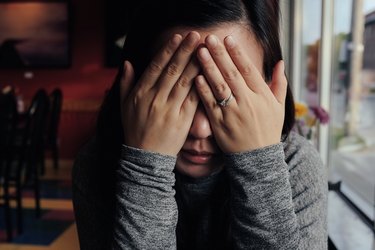
Fights with your SO. Tear-jerker movies. Your team losing the championship. Breakups. There are lots of reasons that can lead to a good old-fashion cryfest.
While those tears may help release built-up emotions, they can also lead to a range of post-cry symptoms including puffy eyes, runny nose, red face, and worst of all, a pounding headache after crying.
Video of the Day
Video of the Day
Read more: Are Calories Burned While Crying?
Why Does Your Head Hurt When You Cry?
While you may feel better after a long, hard cry, there's a good chance that your head won't. It's not unusual to end a cry session with a pounding headache.
The exact reasons why you can get a headache after crying aren't totally clear, says Fiona Gupta MD, assistant professor of neurology at Icahn School of Medicine at Mount Sinai. But, there are a few speculated causes.
"Crying can cause muscle tension in the head, neck, and jaw therefore leading to a tension type headache, particularly after longer bouts of crying," explains Gupta.
Another reason you may get a headache after crying is related to the type of tears you release. Your body produces three types of tears: basal tears (which keep your eyes moist), reflex tears (which pop up as a reaction to irritants like onions or smoke) and emotional tears (which are caused when your cerebrum triggers your body to release hormones to the eyes causing tears).
"If tears are due to a stressful emotional situation, this can release a stress hormone called cortisol which leads to inflammation - a trigger for headaches as well as other pain neuropeptides," Gupta reveals.
Also, if the tears stem from a more long-term sadness - the death of a loved one or ongoing relationship troubles rather than just a sad movie - there is also a chance that you might not be adequately caring for your body by not properly sleeping, exercising, or eating well, which could also trigger a headache, says Gupta.
Can Crying Cause Migraines?
While there are many different kinds of headaches, a headache from crying will usually be a tension headache that can feel like a tight, band of pressure around your forehead, temples and back of the head.
However, Dr. Gupta explains, it is possible to get a migraine from crying, especially if the crying is related to negative emotions. "Stress is one of the largest triggers of migraines," Gupta points out.
Unlike a tension headache, a migraine is a more intense, throbbing pain, often focused around one or both eyes. Migraines also often include visual auras, sensitivity to light, smells and noise and even nausea or vomiting.

What Are the Other Side Effects of Crying too Much?
In addition to headaches, crying for an extended period can lead to swollen, irritated eyes, sinus congestion, and even neck and jaw pain. The neck and jaw pain are often due to muscle tension and stiffening from tightening the neck and face muscles for a prolonged period.
Read more: Foods That Help Sinus Congestion
How to Help A Headache After Crying
If you have a headache after crying, there are steps you can take to alleviate your discomfort, says Gupta. "The use of warm compresses, massage, and stretching may help with tension headaches post-crying and over-the-counter pain medicine (such as NSAIDs, naproxen, Excedrin, etc) may be helpful for occasional use."
Above all, take care of your basic bodily needs, reminds Gupta. "Take care of yourself! Drink water, exercise, sleep, eat well and have a positive outlook." Try splashing cold water on your face or going for a short walk to help you move on post-cry.
Read more: 8 Signs of Depression You Shouldn't Ignore
Can You Die of Sadness?
If you find that crying has become a regular occurrence for you or your sadness has been prolonged, get help, recommends Gupta. While you can't die from crying itself, regular and prolonged sadness can have a negative impact on both your physical and mental health.
Prolonged sadness can also be a sign of something more serious such as depression. While people who are sad aren't always depressed, people who are depressed often list sadness as one of the most common symptoms.
According to the National Institute of Mental Health, depression has been linked to higher rates of cardiovascular disease, diabetes, stroke, and Alzheimer's disease which can be fatal. If your sadness is prolonged, reach out to your primary care physician, local mental health provider or MentalHealth.gov.
Read more: Is Our Loneliness Killing Us?